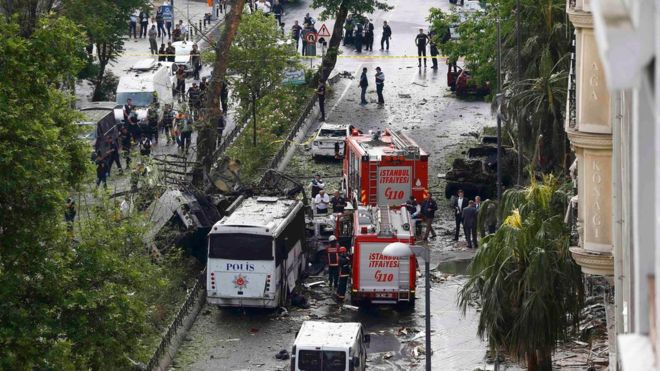11 Killed In Deadly Blast In Istanbul

LONDON: At least 11 people have been killed and 36 others injured after a bomb attack on a police vehicle in Istanbul. The explosion occurred during morning rush hour on Tuesday, ripping through central Istanbul near a prominent university and tourist sites.
At the time of writing, details are still sketchy and will take some time to emerge. There are conflicting reports about the exact location of the blast. According to CNN Turk, the bomb attack occurred in the central Istanbul district of Vezneciler. Turkish broadcaster NTV reported that a powerful blast took place in the city's Beyazıt area.
No one, as yet, has claimed responsibility for the blast.
The blast comes as Turkey sees an escalation in violence, as a result of a combination of factors -- tensions with Kurdish separatists, developments in Syria, and Turkey’s own track record involving the two. A two year ceasefire between Turkey and Kurdish militant group PKK broke down last summer. Further, Turkey is part of the US-led coalition that is fighting the Islamic State, making the country a clear target for the group.
Recent attacks have been claimed by both the Islamic State and by Kurdish separatists. Some recent attacks include an attack by Kurdish militants in Ankara that killed 36 people in March; a suicide blast in Istanbul that killed 4 in March; 28 people killed in a military convoy in Ankara in February; 12 German tourists killed in a bombing suspected to have the hand of the Islamic State in Istanbul in January; and more than a 100 people killed last year in October at a Kurdish peace rally in Ankara.
The escalation in violence is a result of Turkey’s two pronged conflict -- on its border as part of the US-coalition against the Islamic State and within its borders given its long, complicated history with Kurdish groups. Whilst the engagement against the Islamic State is more recent, the government in Ankara has for decades fought a war with the PKK (Kurdistan Workers' Party). For two years, a ceasefire brought relative peace to the country, but this broke down last summer after a bombing killed 32 young Kurdish and left-wing activists in the south-eastern city of Suruc in July.
Ankara suspects the Islamic State’s involvement in the attack, as those targeted were traveling across the border to help rebuild the battered city of Kobane. The PKK accused Turkey of wanting IS fighters to succeed in an attempt to put a stop to Kurdish territorial gains in Syria and Iraq, and responded with a wave of counter attacks.
The Kurds maintain that Turkey, in a bid to crush Kurdish separatism, is aiding and abetting the Islamic State as and when it suits that goal. "[President] Erdogan is behind IS massacres. His aim is to stop the Kurdish advance against them," PKK leader Cemil Bayik told the BBC at the time.
When Turkey began bombing Islamic State targets within Syria in July last year, the Kurds maintained that the Turkish fighter jets were bombing their ‘guerillas’ and the civilians in South Kurdistan that essentially lies in Iraq. “Yesterday on the 24th of July, at 10:55pm Turkish jets have bombed Kurdish areas (Xakurke, Qandil, Behdinan, Zap, Gare, Basye, Amedia, and Avasin) in south Kurdistan where mostly PKK guerrillas and civilians are situated. This attacks are still continuing,” said a statement by the Kurdish National Congress at the time.
“The AKP government authorized Turkish military and air force to bomb these civilian areas, including in Xakurke and the Enze village in Qandil. Reports from local sources indicate that a number of civilians were injured during these attacks, with villages, farms and homes destroyed,” the statement read. Clearly according to this the Turkish targets were not what its government claimed to be the Islamic State, but really all those opposing the regime in Ankara.
In fact, Kurds in the region have consistently blamed Turkey for fanning IS, with Turkey being suspicious of Syria’s Kurdish militia the People’s Protection Units (YPG) and its political counterpart Democratic Unity Party (PYD) as they are the Syrian counterpart to the Kurdistan Workers Party (PKK) which has advocated Kurdish self-rule in Turkey since 1984.



